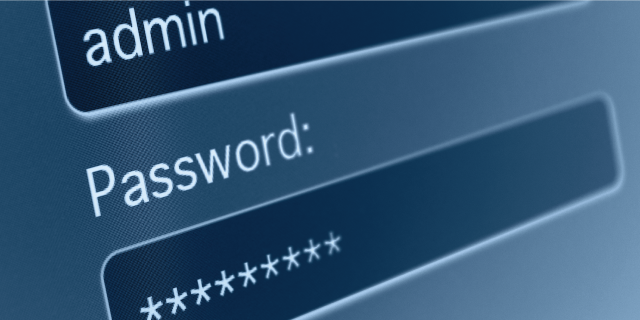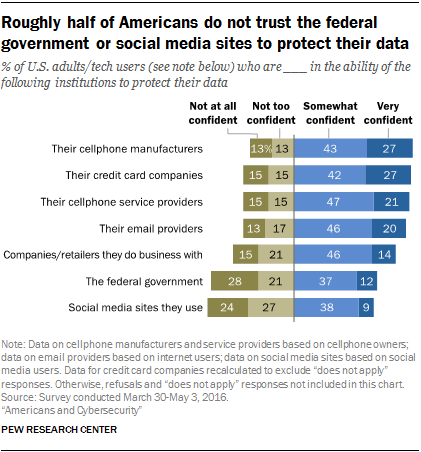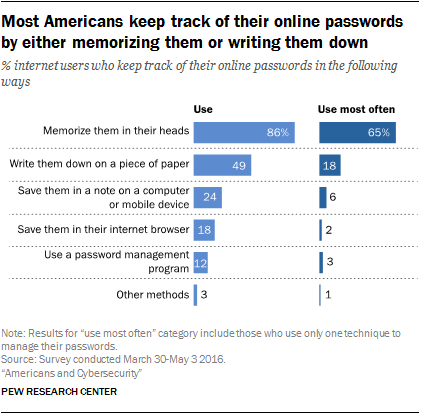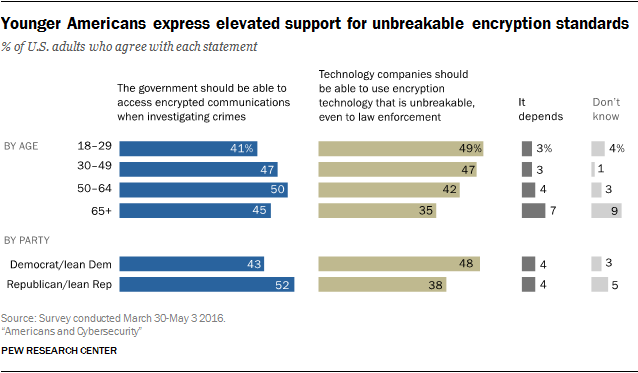How Much Money Did Us Lose To Cyberattacks In 2016

Cyberattacks and data breaches are facts of life for government agencies, businesses and individuals akin in today'southward digitized and networked world. Simply a few of the most high-profile breaches in 2016 alone include the hacking and subsequent release of emails from members of the Autonomous National Committee; the release of testing records of dozens of athletes conducted by the Globe Anti-Doping Bureau; and the announcement by Yahoo that hackers had accessed the private information associated with roughly 1 billion email accounts. Finally, in belatedly 2016 and early 2017 U.S. intelligence agencies (the FBI, CIA and Department of Homeland Security) both issued statements and testified earlier Congress that the Russian authorities was involved in the hack of the DNC with the aim of influencing the 2016 presidential election.
Previous Pew Research Eye studies of the digital privacy environment have constitute that many Americans fright they have lost control of their personal information and many worry whether government agencies and major corporations tin protect the client information they collect. Equally part of this ongoing series of studies on the state of online privacy and security, the Center conducted a national survey of ane,040 adults in the jump of 2016 to examine their cybersecurity habits and attitudes. This survey finds that a majority of Americans have direct experienced some grade of data theft or fraud, that a sizeable share of the public thinks that their personal data have become less secure in recent years, and that many lack conviction in diverse institutions to proceed their personal data safe from misuse. In add-on, many Americans are failing to follow digital security best practices in their ain personal lives, and a substantial majority expects that major cyberattacks will exist a fact of life in the future. Among the key findings:
A majority of Americans (64%) have personally experienced a major information breach, and relatively large shares of the public lack trust in primal institutions – especially the federal government and social media sites – to protect their personal information

Information security is a personal issue for many Americans: The survey finds that a majority of the public has noticed or been notified of a major data breach impacting their sensitive accounts or personal data. The survey examined several dissimilar types of data theft and found that 64% of U.S. adults have been impacted past at least one of them:
- 41% of Americans have encountered fraudulent charges on their credit cards.
- 35% take received notices that some type of sensitive information (like an account number) had been compromised.
- 16% say that someone has taken over their email accounts, and 13% say someone has taken over one of their social media accounts.
- fifteen% have received notices that their Social Security number had been compromised.
- xiv% say that someone has attempted to take out loans or lines of credit in their name.
- half-dozen% say that someone has impersonated them in order to file fraudulent tax returns.
And beyond these specific experiences, roughly one-half of Americans (49%) experience that their personal information is less secure than it was 5 years ago. Around ane-in-five (18%) feel that their information has gotten more secure in contempo years, while 31% feel that their data is about equally safe equally it was v years ago. Americans historic period 50 and older are especially probable to feel that their personal data has become less safe in recent years: 58% of Americans in this age group limited this opinion, compared with 41% of those ages 18 to 49.
In add-on, many Americans lack religion in various public and individual institutions to protect their personal information from bad actors. They limited some level of concern well-nigh a multifariousness of entities, ranging from telecommunications firms to credit card companies. But their fears are especially pronounced for 2 institutions in detail: the federal government and social media platforms. Some 28% of Americans are non confident at all that the federal government can keep their personal information rubber and secure from unauthorized users, while 24% of social media users lack any confidence in these sites to protect their information. By dissimilarity, just 12% of Americans (and 9% of social media users) have a very loftier level of confidence that these entities tin can keep their personal information safe and secure.
Many Americans fail to follow cybersecurity all-time practices in their ain digital lives

At the same time that they express skepticism about whether the businesses and institutions they interact with can adequately protect their personal information, a substantial share of the public admits that they do not always incorporate cybersecurity best practices into their ain digital lives.
This lack of adherence to best practices begins with the means that Americans keep track of the passwords to their online accounts. Cybersecurity experts by and large recommend password management software as the safest and well-nigh secure style to track and maintain online passwords.
Nonetheless, just 12% of internet users say that they ever use countersign management software themselves – and only three% say that this is the password technique they rely on most. Instead, roughly two-thirds (65%) of net users say that memorization is the master or only way they keep rails of their online passwords – and some other 18% rely primarily on writing their passwords down on a piece of newspaper. In other words, fully 84% of online adults rely primarily on memorization or pen and newspaper as their main (or only) arroyo to password direction.
A substantial share of Americans are taking steps or following password protection strategies that experts recommend against:
- 41% of online adults have shared the password to one of their online accounts with a friend or family member.
- 39% say that they use the aforementioned (or very similar) passwords for many of their online accounts.
- 25% admit that they oftentimes utilize passwords that are less secure than they'd like, considering simpler passwords are easier to remember than more than complex ones.
The survey also finds that Americans are not always vigilant in the context of mobile security. For instance, 28% of smartphone owners study that they do not use a screen lock or other security features in order to access their telephone, while around ane-in-10 report that they never install updates to their smartphone's apps or operating organization. Meanwhile, 54% of online adults report that they utilize potentially insecure public Wi-Fi networks – with around 1-in-5 of these users reporting that they employ these networks to perform sensitive activities such as e-commerce or online banking.
To exist sure, the story of cybersecurity is far from universally negative. For instance, roughly half of online adults (52%) report that they utilize two-step hallmark on at least some of their online accounts. And majorities betoken that they do in fact have recommended steps such as utilizing different passwords from site to site or placing a security characteristic on their smartphones. But overall, the style that users care for and manage their online passwords and their overall digital security can be described as mixed at best.
Cybersecurity is non a acme-of-mind worry for most Americans
Despite their concerns and experiences, well-nigh Americans do not limited profound worries about cybersecurity in their personal lives or in their expectations for various public institutions.
In the context of their personal lives, fully 69% of online adults say they do non worry about how secure their online passwords are – more than double the share (30%) that admits to having worries most their personal password security. And Americans who have personally experienced a major information breach are generally no more than likely than boilerplate to have additional means to secure their passwords (such every bit using password direction software).
More broadly, a substantial majority of Americans conceptualize major cyberattacks in the next v years on our nation'due south public infrastructure (70% expect that this will happen) or banking and financial systems (66%). Yet a majority of Americans experience that the U.Due south. authorities is at least somewhat prepared to handle cyberattacks on our public infrastructure (62%) or government agencies (69%), while 61% have some confidence that U.South. businesses are prepared to handle attacks on their ain systems. Yet, it is worth noting that this survey was fielded prior to the revelations of some more recent, high-profile information breaches, including the hacking of the DNC email arrangement and the breach of electronic mail accounts of Yahoo customers.
Americans keep to be highly divided on the issue of encryption
Americans remain divided on the issue of encryption: 46% believe that the government should exist able to admission encrypted communications when investigating crimes, while 44% believe that engineering companies should exist able to use encryption tools that are unbreakable fifty-fifty to law enforcement. Democrats and younger adults tend to express greater back up for strong encryption, while Republicans tend to express greater support for encryption protocols that tin exist accessed by law enforcement in the context of criminal investigations.

Source: https://www.pewresearch.org/internet/2017/01/26/americans-and-cybersecurity/
Posted by: campbellyeard1966.blogspot.com

0 Response to "How Much Money Did Us Lose To Cyberattacks In 2016"
Post a Comment